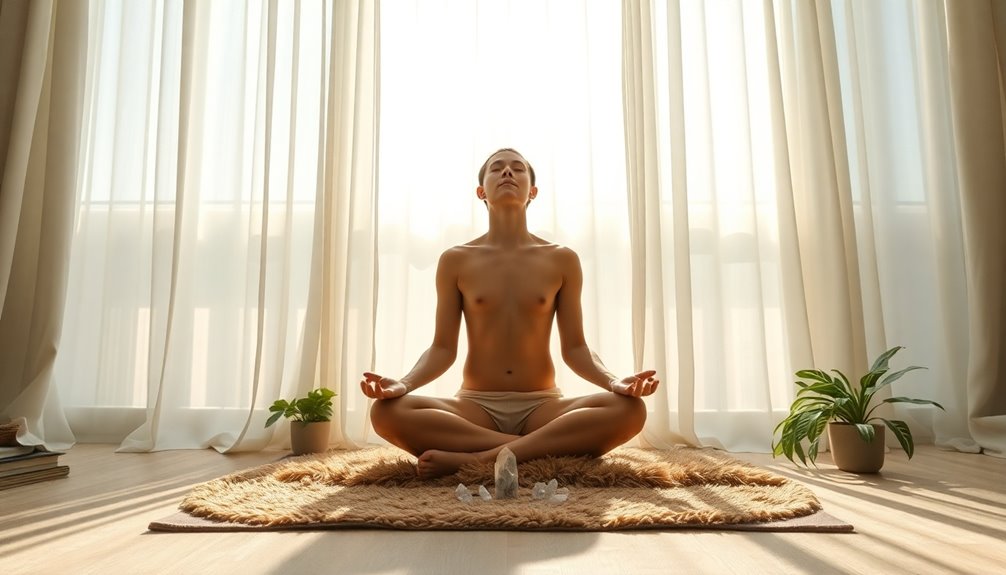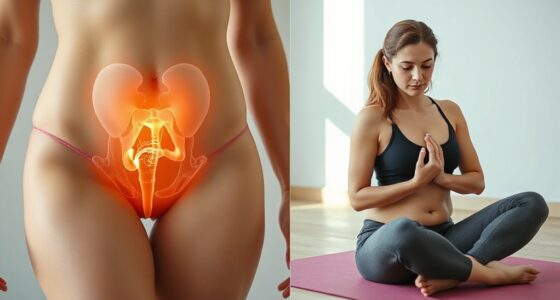Self-exploration is your path to understanding your body and enhancing your well-being. It deepens your awareness of physical sensations and emotional responses, making you more in tune with yourself. Embracing body acceptance helps build confidence, while mindfulness techniques like yoga and breathwork can elevate your self-awareness. Solo pleasure practices also offer valuable insights into your desires and improve your overall emotional health. To foster reflection, journaling can track your thoughts and feelings, guiding your personal growth. There's much more to explore about this journey, waiting just beyond this point.
Key Takeaways
- Engage in mindfulness practices like deep breathing and yoga to enhance body awareness and connect with physical sensations.
- Utilize journaling tools, such as mood trackers and self-exploration questions, to reflect on your body image and emotional patterns.
- Recognize societal influences on body image and challenge unrealistic beauty standards to foster self-acceptance and improve self-esteem.
- Practice solo pleasure to better understand your desires, reduce stress, and enhance your connection with your body.
- Explore guided meditations and body scanning techniques to increase self-awareness and identify areas of tension within your body.
The Importance of Self-Exploration

Self-exploration is essential for understanding who you really are, as it deepens your awareness of your thoughts, beliefs, and emotions. Engaging in self-reflection allows you to clarify your values and aspirations, paving the way for personal growth.
By incorporating mindfulness practices, like journaling and meditation, you create a space to observe your internal states without judgment. This process not only enhances your mental well-being but also helps reduce anxiety and build emotional resilience.
When you confront limiting beliefs and fears, you empower yourself to navigate life's challenges more effectively. Remember, self-exploration isn't a one-time event; it's a continuous journey that evolves with your experiences, fostering ongoing self-acceptance and development. Embracing the power of intention can further enhance your self-exploration process, helping you align your actions with your deepest desires.
Embrace it for a richer understanding of yourself.
Understanding Body Image Perspectives

You might notice how cultural beauty standards often shape your views on body image, pushing unrealistic ideals that can leave you feeling dissatisfied.
Medical conversations about weight and health can further distort your perception, making it tough to appreciate your body as it is.
Recognizing these influences is key to fostering a healthier relationship with yourself and improving your self-esteem.
Cultural Beauty Standards
Cultural beauty standards shape how individuals perceive their bodies, often creating unrealistic ideals that are difficult to attain.
These standards make sense in a society that values specific appearances, but they can also be a powerful tool for self-doubt and intrusive thoughts. When you constantly see idealized body types in media, it can distort your self-image and lead to dissatisfaction.
This dissatisfaction can manifest in negative self-perceptions and even contribute to eating disorders. Embracing body acceptance is vital; it encourages you to foster positive feelings about yourself, which can enhance your overall well-being. Additionally, cultivating self-awareness can help you recognize and challenge these unrealistic beauty standards, leading to a healthier self-image.
Medical Body Image Issues
While many people seek medical advice to improve their health, the conversation around body image often becomes tangled with societal expectations and weight biases.
You may notice that cultural narratives promote unrealistic beauty standards, leading to dissatisfaction with how you perceive your body. Medical discussions often emphasize weight, which can reinforce negative self-perceptions and contribute to eating disorders.
Body shaming in healthcare settings can deeply impact your self-esteem and mental health. It's vital to take time to recognize these internalized messages that block body acceptance and trust.
Acknowledging the importance of self-acceptance can make you feel more resilient against societal pressures, fostering a healthier self-image and enhancing your overall well-being. Embracing positive thinking techniques can support your journey toward greater self-acceptance and personal growth.
Cultivating Mindfulness and Presence

As life speeds up and distractions multiply, cultivating mindfulness can anchor you in the present moment, reducing feelings of disconnection.
By intentionally focusing on the here and now, you enhance your self-awareness and become more attuned to your bodily sensations. This practice helps you recognize signals from your body that contribute to your overall well-being.
Engaging in mindfulness techniques, like deep breathing or brief body scans, even for a few minutes throughout the day, can improve your emotional regulation and decrease anxiety.
You'll foster a greater sense of connection to yourself and others, countering the isolation often felt in today's fast-paced world.
Studies confirm that consistent mindfulness practice boosts mental health, increasing resilience and decreasing symptoms of depression. Additionally, mindfulness aligns with the Law of Attraction principles, which emphasize the importance of positive thoughts and emotional alignment in achieving well-being.
Techniques for Body Awareness

Building on the mindfulness practices you've cultivated, exploring techniques for body awareness can deepen your connection to your physical self.
Start with mindful breathing, which enhances your awareness of bodily sensations and promotes relaxation. You might also engage in yoga, tuning into the feelings that arise during different poses.
Body scanning is another effective method; mentally check in with each part of your body to identify tension and foster embodiment. Guided meditations focused on body awareness can further improve your self-connection and understanding of your physical and emotional states.
Finally, try journaling about your bodily experiences and sensations. This reflective practice can help you recognize how emotions manifest physically, enriching your overall awareness.
Embracing Solo Pleasure Practices

Embracing solo pleasure practices can open up a deeper understanding of your own desires and enhance your intimate experiences.
Many myths suggest that solo pleasure indicates issues in relationships, but the truth is it can greatly boost your confidence and mental well-being. Additionally, engaging in solo pleasure can create a positive environment, reducing stress and promoting relaxation, much like the effects of aromatherapy sessions.
Benefits of Solo Pleasure
While many people may feel hesitant about solo pleasure, it offers numerous benefits that can enhance your overall well-being. Engaging in solo pleasure can notably reduce stress and anxiety by releasing endorphins, helping you relax. It also boosts your confidence, leading to more fulfilling sexual experiences with partners. Regular practice improves sleep quality, promoting relaxation and lowering stress hormones. Additionally, exploring your body fosters body positivity, enhancing self-esteem and mental well-being.
Here's a quick look at some benefits:
| Benefit | Description |
|---|---|
| Stress Reduction | Releases endorphins for relaxation |
| Increased Confidence | Familiarizes you with your sexual responses |
| Improved Sleep Quality | Promotes relaxation, helping you sleep better |
| Body Positivity | Encourages acceptance and boosts self-esteem |
Myths About Solo Pleasure
Many people harbor misconceptions about solo pleasure, thinking it reflects deeper issues in relationships or that it's less fulfilling than partnered sex.
In reality, solo pleasure is a healthy practice that enhances self-awareness and sexual wellness.
Consider these common myths:
- It's a sign of relationship problems – Solo pleasure is simply a form of self-care.
- Masturbation causes desensitization – It actually heightens your awareness of your body's responses.
- It's less fulfilling than partnered sex – Solo exploration can lead to greater overall sexual satisfaction.
- It diminishes performance – Research shows it can reduce anxiety and enhance sexual health.
Embracing solo pleasure can boost your body positivity, self-esteem, and emotional well-being.
Myths Surrounding Solo Pleasure

Why do so many myths surround solo pleasure? One common misconception is that enjoying solo pleasure signals issues in your relationship. In reality, it's a healthy practice that can enhance your sexual wellness, regardless of your relationship status.
Another myth suggests masturbation causes desensitization, but research shows it actually heightens awareness of your body's responses. Some think solo pleasure is less fulfilling than partner sex, yet it offers unique benefits tailored to your individual desires, leading to greater satisfaction.
Additionally, the belief that masturbation harms sexual performance is unfounded; studies indicate it can improve overall sexual health. Ultimately, solo pleasure isn't shameful—it's a normal, essential part of self-care that fosters body positivity and acceptance.
Strategies for Body Trust and Healing

How can you cultivate a deeper sense of body trust and healing? Start by embracing practices that nurture your connection to your body. Here are some strategies to contemplate:
- Intuitive Eating: Listen to your hunger and fullness cues, fostering a healthier relationship with food.
- Yoga: Engage in mindful movement and breath to reconnect with your physical sensations and enhance body awareness.
- Acceptance and Commitment Therapy (ACT): Accept your thoughts and feelings without judgment, improving your self-esteem and body image.
- Empowerment through Sharing: Share your personal body stories to enhance trust and promote agency in your healing journey.
Self-Reflection Questions for Growth

What insights might you uncover by asking yourself reflective questions? Engaging with self-reflection can be a powerful tool for personal growth. By exploring your beliefs, values, and emotional responses, you can deepen your self-awareness and identify patterns in your thoughts and behaviors.
Consider questions focused on body awareness, like "How do I feel physically today?" This can enhance your connection to your bodily sensations and health needs.
Structured self-reflection worksheets can offer diverse perspectives, helping you confront limitations and fears while building resilience. Taking the time to reflect on your experiences through targeted questions fosters an ongoing dialogue with yourself, leading to clarity and informed decision-making in various aspects of your life. Recognizing signs of stagnation in relationships can be crucial for your personal growth journey.
Journaling as a Self-Exploration Tool

Isn't it fascinating how journaling can transform your self-exploration journey? By putting pen to paper, you can truly articulate your thoughts and feelings, leading to deeper self-awareness.
Here are some ways journaling can enhance your experience:
- Daily Mood Trackers help you recognize emotional patterns, empowering you to identify triggers.
- Gratitude Journals shift your focus to positivity, making you appreciate the good in your life.
- Self-Esteem Journals boost your confidence by encouraging you to document achievements and affirmations.
- Self-Exploration Questions promote critical thinking, fostering clarity and personal growth.
Additionally, incorporating mindfulness practices into your journaling routine can further deepen your self-reflection and enhance emotional well-being.
Frequently Asked Questions
How Do I Explore My Own Body?
To explore your own body, start by creating a calming environment—dim the lights and play some soft music.
Use high-quality lubricants to enhance your comfort, and experiment with different pressures and strokes to discover what feels best for you.
Don't hesitate to incorporate sex toys for a varied experience.
Take your time, focusing on your body's responses; this approach helps you connect with your desires and understand what truly brings you pleasure.
Is Exploring Your Body Healthy?
Exploring your body is like starting on an exciting adventure, where each discovery adds depth to your understanding of yourself.
Yes, it's healthy! This practice boosts your body awareness, leading to greater self-acceptance and reduced anxiety.
You'll find that getting to know your preferences enhances your confidence and can make intimate relationships more fulfilling.
Plus, it helps reduce stress, promoting a positive relationship with yourself and supporting your overall mental well-being.
What Does Exploring Your Body Mean?
Exploring your body means tuning into your physical sensations and understanding how they relate to your emotions.
It's about becoming aware of how you feel in different situations and recognizing your body's signals. This process can strengthen your connection to yourself and enhance your overall well-being.
By practicing mindfulness, whether through yoga or meditation, you cultivate a deeper awareness that fosters acceptance and trust in your physical self.
It's a journey toward personal growth.
Why Do We Need Self-Exploration?
Imagine diving into the depths of your own mind, like an explorer in uncharted waters. You need self-exploration to uncover hidden beliefs and emotions that shape your decisions.
It helps you confront fears and limitations, paving the way for personal growth. By engaging in this journey, you enhance your emotional intelligence and improve relationships with yourself and others.
Embracing self-exploration empowers you to make more informed choices and live authentically.
Conclusion
As you commence this journey of self-exploration, remember that understanding your body is like tuning a vintage radio—sometimes, it takes a little fiddling to find the right frequency. Embrace your unique experiences, challenge the myths, and cultivate a deeper connection with yourself. Trust in your body's wisdom, and let curiosity guide you. By nurturing this relationship, you'll uncover layers of self-love and acceptance that resonate through every part of your life.










